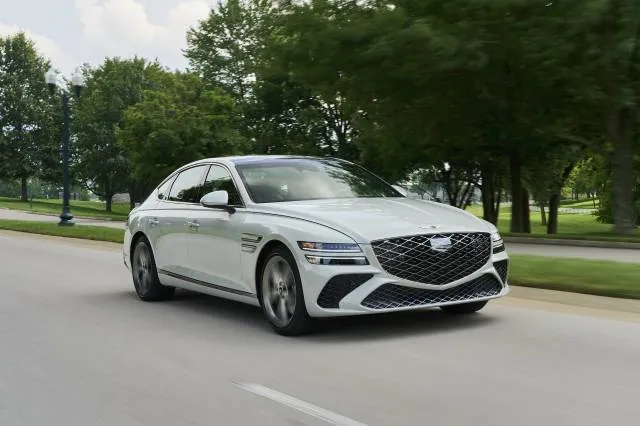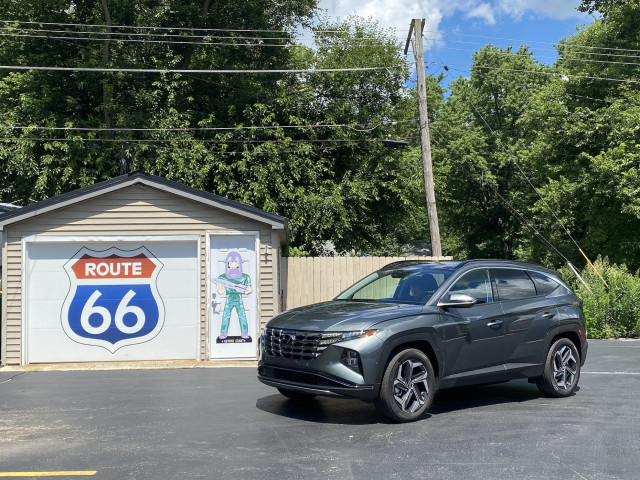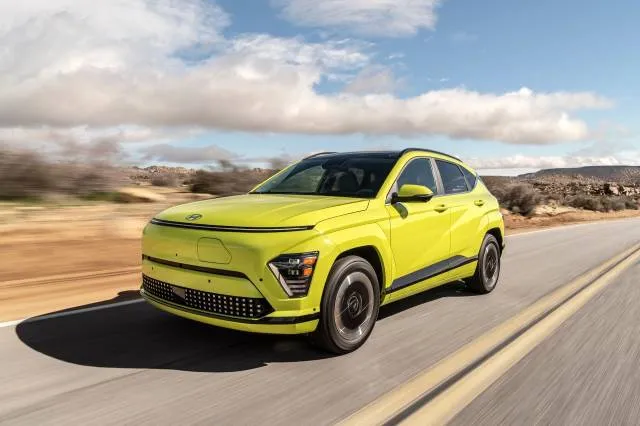- Hyundai will expand its hybrid lineup to Genesis, and double its current hybrid lineup overall
- A new plug-in hybrid will be a midsize SUV that uses its gas engine to recharge its battery pack
- Its EV lineup will grow to 21 models by 2030, from seven now
Hyundai on Wednesday unveiled plans to double its hybrid lineup, sell 21 electric vehicles by 2030, and introduce a new midsize SUV in North America as an extended-range plug-in hybrid electric vehicle.
The ambitious plans shared with investors as part of the multinational’s “Hyundai Way” strategy also outlined the expansion of its performance N line to more EVs, a robotaxi expansion with the Ioniq 5, development of new EV battery technology including solid state batteries, and using hydrogen fuel cell technology for large industry needs. The goal is to net 2 million EV sales globally by 2030.
In the meantime, and as far as new product planned for North America, Hyundai has detailed the following.

2025 Genesis G80
Hyundai to expand hybrid lineup to Genesis
In the statement, Hyundai plans to double its hybrid lineup from seven to 14 models, with production commencing in January 2025. Current hybrids include the Hyundai Elantra compact sedan, Hyundai Sonata midsize sedan, Hyundai Tucson compact crossover, and Hyundai Santa Fe midsize crossover.
“The company will expand the application of its hybrid system beyond compact and midsize cars to small, large and luxury vehicles,” the statement said.
Genesis, Hyundai’s luxury brand, will get its first hybrid and every gas-powered Genesis model will be offered with a hybrid counterpart. The only full battery electric model without a gas counterpart is the Genesis GV60, so every other current Genesis model could get a hybrid option.
The next generation hybrid vehicles will have regenerative braking to help charge the battery on the go as well as vehicle-to-load technology that can use the hybrid’s small battery to power appliances. That technology is most commonly found in plug-in vehicles, not traditional hybrids.
The hybrid push aims to boost hybrid sales by 40% globally by 2028, and Hyundai expects hybrid demand to surge in North America, where there is a “shortage of hybrid supply.” To that point, it plans to manufacture the hybrid models in North America at its Georgia plant, known as Hyundai Motor Group Metaplant America (HMGMA), which initially was slated to handle North American production of electric vehicles, from the current Ioniq 5 hatchback to the forthcoming Ioniq 9 three-row crossover SUV.

2022 Hyundai Tucson PHEV
Hyundai plans new plug-in hybrid with extended-range electric vehicle tech
While Hyundai pumps the brakes on making its Genesis luxury brand all electric by 2030, as well as slowing down the rollout of its Ioniq electric vehicle lineup, it plans on using an extended-range electric vehicle (EREV) as a bridge to electrification. Broadly classified as a plug-in hybrid, the EREV tech used in vehicles such as the Chevy Volt and BMW i3 fell out of favor in the last decade as the electric revolution began to manifest with EVs that could travel more than 200 miles on a single charge. Hyundai sees a value in bringing back the tech.
The benefit of an EREV is that for almost all application other than road tripping, it uses electric only power, similar to a plug-in hybrid. A small engine acts as a generator to charge the large electric battery feeding the propulsion motors. With the gas generator backup, you could travel long distances relying on the existing network of gas stations to refill the generator without stopping to charge the car. It’s suboptimal in terms of efficiency, but mollifies EV infrastructure anxiety.
This planned EREV would likely be a compact crossover such as the Hyundai Tucson or Genesis GV70. The new powertrain would have two motors and all-wheel drive that could have the equivalent range of 560 miles, though Hyundai didn’t detail what type of driving would meet that range estimate. Hyundai listed another advantage.
“The new EREV maximizes the use of the existing engine to improve customer appeal and secure cost competitiveness with similar EVs by reducing high-cost battery capacity.”
In addition to gas and hybrid models, the Hyundai Tucson plug-in hybrid is powered by a 1.6-liter turbo-4 gas engine with a 72-kw electric motor powering the rear axle. It has a 13.8-kwh battery pack with an all electric range of 33 miles. The EREV would likely invert this formula with a much smaller engine, perhaps a 3-cylinder, and a larger battery pack supplying power to a motor for each axle. The electric range would be much greater, but not as high as the 261-mile electric range of the Hyundai Kona. Fill up the gas generator, fully charge the battery, and it could get that 560-mile estimate targeted by Hyundai.
Production of this vehicle would begin late in 2026.

2025 Hyundai Kona Electric
Hyundai targets 21 electric vehicles by 2030
The slowdown in electric vehicle rollout appears temporary, based on Hyundai’s statement.
“The company aims to address the EV deceleration by expanding its hybrid and new EREV offerings and gradually increasing EV models by 2030 when a recovery in EV demand is expected.”
It plans to roll out a full lineup of EVs, from affordable existing cars such as the $39,000 Hyundai Ioniq 6, to expansion of its N performance line and dedicated luxury models.
To get to the 21 electric vehicles by 2030, it would need to triple its current EV lineup across both Hyundai and Genesis brands. Those models are:
Hyundai electric vehicles
- Hyundai Kona EV small crossover
- Hyundai Ioniq 6 sedan
- Hyundai Ioniq 5 hatchback
- Hyundai Ioniq 5 N performance hatch
- Hyundai Ioniq 9 three-row crossover (expected late this year)
Genesis electric vehicles
- Genesis GV60 hatchback
- Genesis Electrified G80 midsize sedan
- Genesis Electrified GV70 compact crossover
Hyundai already leads the industry in electrified vehicles in several respects, including its Ioniq and Genesis GV60 line that boast the quickest fast-charging times on the market thanks to the brand’s 800-volt architecture. Hyundai said to will expedite the development of more energy dense and efficient solid-state batteries, as well as improve efficiency and affordability on more performance-leaning nickel-cobalt-manganese (NCM) batteries.
